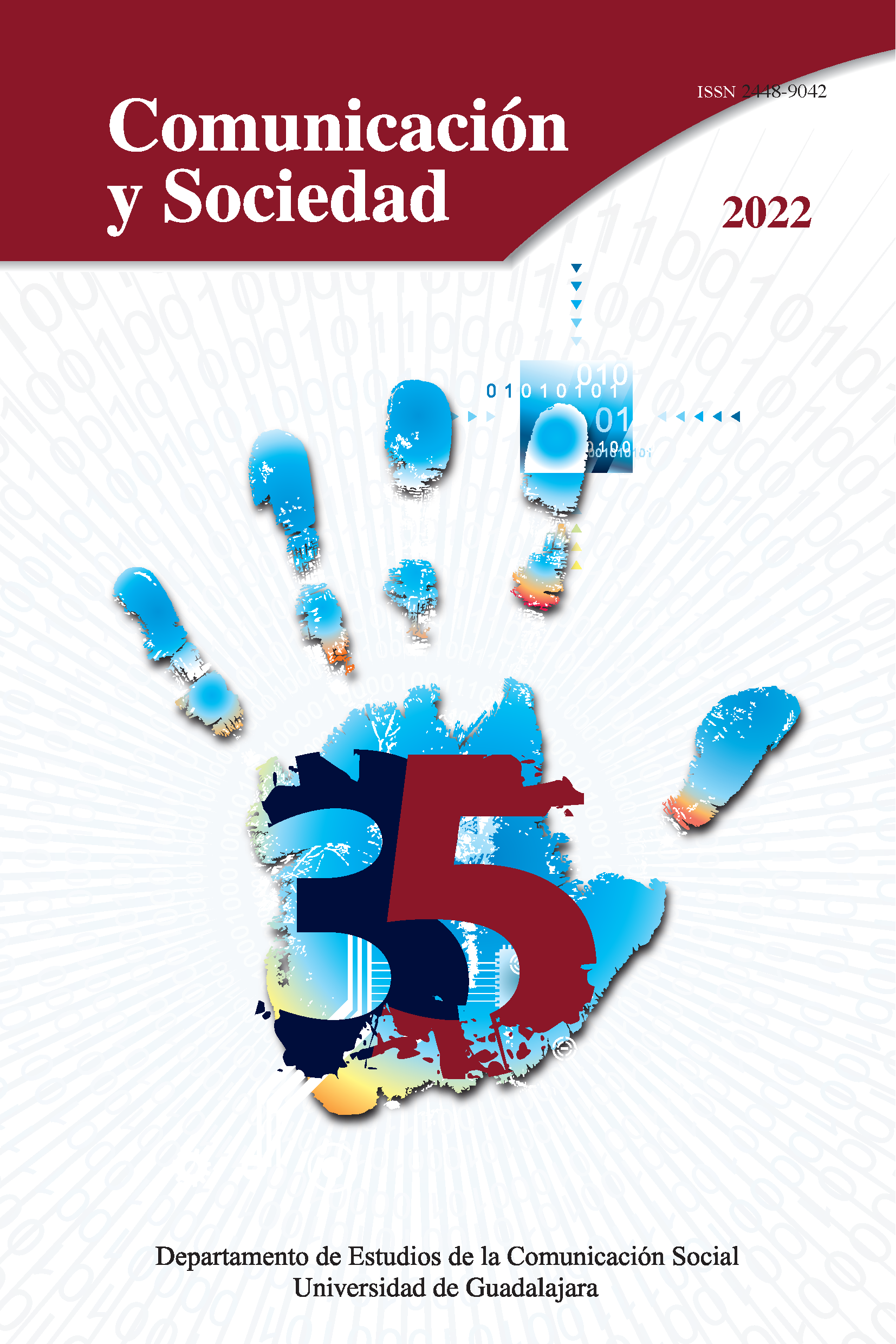¿Compromiso o desafección política? El impacto del desalineamiento partidista y la movilización cognitiva sobre las actitudes políticas de los mexicanos en la campaña presidencial de 2018
DOI:
https://doi.org/10.32870/cys.v2022.8220Palabras clave:
Movilización cognitiva, Desalineamiento partidista, Compromiso político, Desafección política, Campañas electoralesResumen
Se analizaron los patrones de compromiso y desafección políticos entre cuatro grupos relevantes de ciudadanos a partir de sus niveles de partidismo y de movilización cognitiva. Los resultados revelan diferencias significativas entre grupos, con aquellos con mayor grado de movilización cognitiva (partidistas cognitivos y apartidistas) exhibiendo niveles superiores de eficacia política interna, así como menor apatía política cuando se les compara con los grupos con bajos valores en esta variable (partidistas rituales y apolíticos).Descargas
Citas
Austin, E. W. & Pinkleton, B. E. (1995). Positive and negative effects of political disaffection on the less experienced voter. Journal of Broadcasting & Electronic Media, 39, 215-235. https://doi.org/10.1080/08838159509364300
Austin, E. W. & Pinkleton, B. E. (1999). The relation between media content evaluations and political disaffection. Mass Communication & Society, 2(3/4), 105-122. https://doi.org/10.1080/15205436.1999.9677867
Balch, G. I. (1974). Multiple Indicators in Survey Research: The Concept “Sense of Political Efficacy”. Political Methodology, 1(2), 1-43. https://www.jstor.org/stable/25791375
Bennett, S. E. (1986). Apathy in America, 1960-1984: Causes and consequences of citizen political indifference. Transnational Publishers.
Buendía, J. & Somuano Ventura, M. F. (2003). Participación electoral en nuevas democracias: la elección presidencial de 2000 en México. Política y Gobierno, X(2), 289-323. http://www.politicaygobierno.cide.edu/index.php/pyg/article/view/342
Campbell, A., Gurin, G. & Miller, W. E. (1954). The Voter Decides. Row and Peterson.
Campbell, A., Converse, P. E., Miller, W. E. & Stokes, D. E. (1960). The American Voter. John Wiley.
Cappella, J. N. & Jamieson, K. H. (1997). Cynicism or realism? En Spiral of cynicism: The press and the public good (pp. 17-37). Oxford University Press.
Converse, P. E. (1972). Change in the American Electorate. En A. Campbell & P. E. Converse (Eds.), The Human Meaning of Social Change (pp. 263-337). Russell Sage Foundation.
Cisneros, I. (2020). Independencia partidista en América Latina: Actitudes, comportamiento y decisión de voto. Latin American Research Review, 55(4), 706-726. http://doi.org/10.25222/larr.457
Craig, S. C., Niemi, R. G. & Silver, G. E. (1990). Political Efficacy and Trust: A Report on the NES Pilot Study Items. Political Behavior, 12(3), 289-314. https://doi.org/10.1007/BF00992337
Crotty, W. J. & Jacobson, G. C. (1980). Television and the politics of media. En American Parties in Decline (pp. 67-99). Brown, Little and Company.
Dalton, R. J. (1984). Cognitive Mobilization and Partisan Dealignment in Advanced Industrial Democracies. The Journal of Politics, 46(1), 264-284. https://doi.org/10.2307/2130444
Dalton, R. J. (2000a). Citizen attitudes and political behavior. Comparative Political Studies, 33(6-7), 912-940. https://doi.org/10.1177%2F001041400003300609
Dalton, R. J. (2000b). The Decline of Party Identifications. En R. J. Dalton & M. P. Wattenberg (Eds.), Parties without Partisans: Political Change in Advanced Industrial Democracies (pp. 19-36). Oxford University Press.
Dalton, R. J. (2012). Apartisans and the Changing German Electorate. Electoral Studies, 31(1), 35-45. https://doi.org/10.1016/j.electstud.2011.06.005
Dalton, R. J. (2013). The Apartisan American: Dealignment and Changing Electoral Politics. CQ Press.
Dalton, R. J. (2020). Citizen Politics: Public Opinion and Political Parties in Advanced Industrial Democracies (7a ed.). CQ Press.
Dalton, R. J., McAllister, I. & Wattenberg, M. P. (2000). The Consequences of Partisan Dealignment. En R. J. Dalton & M. P. Wattenberg (Eds.), Parties without Partisans: Political Change in Advanced Industrial Democracies (pp. 37-63). Oxford University Press.
Dalton, R. J. & Wattenberg, M. P. (Eds.). (2000). Parties without Partisans: Political Change in Advanced Industrial Democracies. Oxford University Press
De Vreese, C. H. (2005). The Spiral of Cynicism Reconsidered. European Journal of Communication, 20(3), 283-301. https://doi.org/10.1177%2F0267323105055259
De Vreese, C. H. & Semetko, H. A. (2002). Cynical and engaged. Strategic campaign coverage, public opinion, and mobilization in a referendum. Communication Research, 29, 615-641. https://doi.org/10.1177%2F009365002237829
Delli Carpini, M. X. (2004). Mediating Democratic Engagement: The Impact of Communications on Citizens’ Involvement in Political and Civic Life. En L. L. Kaid (Ed.), Handbook of Political Communication Research (pp. 395-434). Lawrence Erlbaum Associates.
Díaz Jiménez, O. F. (2017). Las campañas electorales, los medios y su impacto en el compromiso cívico de los mexicanos en la elección presidencial de 2012. Comunicación y Sociedad, (29), 139-164. https://doi.org/10.32870/cys.v0i29.6302
Díaz Jiménez, O. F. (2019). El Sistema de Partidos Mexicano después de la Elección Crítica de 2018. Desalineamiento, Cartelización y Desinstitucionalización. Estudios sobre las Culturas Contemporáneas, Número Especial, (V), 33-71. https://bit.ly/3oW9Vcg
Díaz Jiménez, O. F. & Muñiz, C. (2017). Los efectos de la comunicación política en el compromiso político de los jóvenes en la elección presidencial mexicana de 2012. Revista Mexicana de Ciencias Políticas y Sociales, 62(229), 181-221. http://dx.doi.org/10.1016/S0185-1918(17)30008-9
Donovan, T. (2017). Cognitive Mobilization. En K. Arzheimer, J. Evans & M. S. Lewis-Beck (Eds.), The Sage Handbook of Electoral Behaviour (pp. 313-335). Sage.
Eveland, W. P. & Morey, A. C. (2011). Challenges and Opportunities of Panel Designs. En E. P. Bucy & R. L. Holbert (Eds.), Sourcebook for Political Communication Research: Methods, Measures, and Analytical Techniques (pp. 19-33). Routledge.
Gimenes, É. R. & Borba, J. (2017). Apartidarismo e adesão à democracia na América Latina. Revista Latinoamericana de Opinión Pública, 7(7), 63-97. https://doi.org/10.14201/rlop.22331
Greene, K. F. (2015). Campaign effects in Mexico since democratization. En J. I. Domínguez, K. F. Greene, C. H. Lawson & A. Moreno (Eds.), Mexico’s evolving democracy: a comparative study of the 2012 elections (pp. 128-152). Johns Hopkins University Press.
Gunther, R. & Montero, J. R. (2006). The Multidimensionality of Political Support: Conceptual Redefinition and Empirical Refinement. En M. Torcal & J. R. Montero (Eds.), Political Disaffection in Contemporary Democracies: Social Capital, Institutions, and Politics (pp. 46-78). Routledge.
Gunther, R., Costa Lobo, M., Bellucci, P. & Lisi, M. (2016). The changing determinants of the vote. En R. Gunther, P. A. Beck, P. Magalhães & A. Moreno (Eds.), Voting in Old and New Democracies (pp. 150-192). Routledge.
Gunther, R., Montero, J. R. & Torcal, M. (2007). Democracy and Intermediation: Some Attitudinal and Behavioural Dimensions. En R. Gunther, H.-J. Puhle & J. R. Montero (Eds.), Democracy, Intermediation, and Voting on Four Continents (pp. 29-74). Oxford University Press.
Iyengard, S. & Vavreck, L. (2012). Online Panels and the Future of Political Communication Research. En H. A. Semetko & M. Scammell (Eds.), The Sage Handbook of Political Communication (pp. 225-240). Sage.
Klar, S. & Krupnikov, Y. (2016). Independent Politics: How American Disdain for Parties Leads to Political Inaction. Cambridge University Press.
Lupu, N. (2015). Partisanship in Latin America. En R. E. Carlin, M. M. Singer & E. J. Zechmeister (Eds.), The Latin American Voter: Pursuing, Representation and Accountability in Challeging Contexts (pp. 226-245). University of Michigan Press.
Mair, P. (2013). Ruling The Void: The Hollowing of Western Democracy. Verso Books.
Mair, P., Müller, W. C. & Plasser, F. (Eds.). (2004). Political Parties and Electoral Change: Party Responses to Electoral Markets. Sage.
Maldonado Hernández, G. (2013). Desapego político y desafección institucional en México: ¿desafíos para la calidad de la democracia? Política y Gobierno, Desafíos de la política mexicana, (Temático), 109-138. http://www.politicaygobierno.cide.edu/index.php/pyg/article/view/1053
Meixueiro, G. (2014). Los Electores Independientes en México en 2006 y 2012. En G. Meixueiro & A. Moreno (Eds.), El Comportamiento Electoral Mexicano en las Elecciones de 2012 (pp. 141-171). Centro de Estudios Sociales y de Opinión Pública/Cámara de Diputados.
Moreno, A. (2009). La Decisión Electoral: Votantes, Partidos y Democracia en México. Miguel Ángel Porrúa.
Moreno, A. (2012). Who Is the Mexican Voter? En R. A. Camp (Comp.), The Oxford Handbook of Mexican Politics (pp. 571-595). Oxford University Press.
Moreno, A. (2018). El cambio electoral: votantes, encuestas y democracia en México. Fondo de Cultura Económica.
Moy, P. & Hussain, M. M. (2011). Media Influences on Political Trust and Engagement. En G. C. Edwards III, L. R. Jacobs & R. Y. Shapiro (Eds.), The Oxford Handbook of American Public Opinion and the Media (pp. 220-250). Oxford University Press.
Muñiz, C. (2019). Prácticas comunicativas y desafección política en el contexto de las campañas electorales. Análisis de su relación desde el modelo O-S-R-O-R. Index. Comunicación, 9(1), 80-107. https://doi.org/10.33732/ixc/09/01Practi
Nadeau, R., Lewis-Beck, M. S. & Turgeon, M. & Gélineu, F. (2017). Latin American Elections Choice and Change. University of Michigan Press.
Norris, P. (2000a). The impact of television on civic malaise. En S. J. Pharr & R. D. Putnam (Eds.), Disaffected democracies: What's troubling the trilateral countries? (pp. 231-252). Princeton University Press.
Norris, P. (2000b). A virtuous circle: Political communications in postindustrial societies. Cambridge University Press.
Ortega Ortiz, R. Y., Somuano Ventura, M. F. & Ruiz Pérez, A. (2011). Identidad partidista y democracia en los estados mexicanos. En S. Martí i Puig, R. Y. Ortega Ortiz & M. F. Somuano Ventura (Eds.), La democracia en México: un análisis a 10 años de la alternancia (pp. 97-134). Edicions Bellaterra.
Pinkleton, B. E. & Austin, E. W. (2001). Individual motivations, perceived media importance, and political disaffection. Political Communication, 18(3), 321-334. https://doi.org/10.1080/10584600152400365
Pinkleton, B. E. & Austin, E. W. (2004). Media perceptions and public affairs apathy in the politically inexperienced. Mass Communication & Society, 7(3), 319-337. https://doi.org/10.1207/s15327825mcs0703_4
Putnam, R. D. (1993). Making Democracy Work: Civic Traditions in Modern Italy. Princeton University Press.
Somuano Ventura, M. F. (2014). Las identidades partidistas de los mexicanos y la elección de 2012. En G. M. & Alejandro Moreno (Eds.), El comportamiento electoral mexicano en las elecciones de 2012 (pp. 117-140). Centro de Estudios Sociales y de Opinión Pública/ Cámara de Diputados.
Somuano Ventura, M. F. & Ortega Ortiz, R. Y. (2003). La identificación partidista de los mexicanos y el cambio electoral, 1994-2000. Foro Internacional, 171, 10-38. https://forointernacional.colmex.mx/index.php/fi/article/view/1675
Temkin Yedwab, B. & Flores-Ivich, G. (2014). Exposición a Medios de Comunicación y Participación Electoral. En G. Meixueiro & A. Moreno (Eds.), El Comportamiento Electoral Mexicano en las Elecciones de 2012 (pp. 265-281). Centro de Estudios Sociales y de Opinión Pública/Cámara de Diputados.
Temkin Yedwab, B., Solano, S. & del Tronco, J. (2008). Explorando el “apartidismo” en México: ¿apartidistas o apolíticos?”. América Latina Hoy, 50,119-145. https://doi.org/10.14201/alh.1344
Torcal, M. (2003). Political Disaffection and Democratization History in New Democracies. Kellogg Working Paper Series, 308. University of Notre Dame.
Torcal, M. & Montero, J. R. (2006). Political disaffection in comparative perspective. En M. Torcal & J. R. Montero (Eds.), Political Disaffection in Contemporary Democracies. Social Capital, Institutions, and Politics (pp. 3-19). Routledge.
Verba, S., Burns, N. & Schlozman, K. L. (1997). Knowing and Caring about Politics: Gender and Political Engagement. The Journal of Politics, 59(4), 1051-1072. https://doi.org/10.2307/2998592
Weisberg, H. & Greene, S. (2003). The Political Psychology of Party Identification. En M. MacKuen & G. Rabinowitz (Eds.), Electoral Democracy (pp. 83-124). University of Michigan Press.
Yamamoto, M. & Kushin, M. J. (2014). More harm than good? Online media use and political disaffection among college students in the 2008 election. Journal of Computer-Mediated Communication, 19(3), 430-445. http://doi.org/10.1111/jcc4.12046
Yamamoto, M., Kushin, M. J. & Dalisay, F. (2013). Social Media and Mobiles as Political Mobilization Forces for Young Adults: Examining the Moderating Role of Online Political Expression in Political Participation. New Media & Society, 17(6), 880-898. https://doi.org/10.1177%2F1461444813518390
Zmerli, S., Newton, K. & Montero, J. R. (2007). Trust in People, Confidence in Political Institutions, and Satisfaction with Democracy. En J. W. Van Deth, J. R. Montero & A. Westholm (Eds.), Citizenship and Involvement in European Democracies: A Comparative Analysis (pp. 35-65). Routledge.
Descargas
Publicado
Cómo citar
Número
Sección
Licencia
Derechos de autor 2022 Oniel Francisco Díaz Jiménez

Esta obra está bajo una licencia internacional Creative Commons Atribución-NoComercial 4.0.
Los autores/as que publiquen en esta revista aceptan las siguientes condiciones:
De acuerdo con la legislación de derechos de autor, los autores conservan los derechos de autoría y otorgan a Comunicación y Sociedad el derecho de primera comunicación pública de la obra. Comunicación y Sociedad no realiza cargos a los autores por enviar y procesar artículos para su publicación.
Los autores/as pueden realizar otros acuerdos contractuales independientes y adicionales para la distribución no exclusiva de la versión del artículo publicado en Comunicación y Sociedad (por ejemplo incluirlo en un repositorio institucional o publicarlo en un libro) siempre que indiquen claramente que el trabajo se publicó por primera vez en Comunicación y Sociedad.











